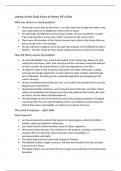Unrest in the Early Years of Henry VII’s Rule
Why was Henry in a weak position?
Henry had a weak claim to the throne – his main claim was through his mother, who
was a descendant of an illegitimate child of John of Gaunt.
He had fought and killed the previous king in battle, and was considered a usurper –
if he could overthrow a king, why couldn’t someone do the same to him?
There were still members of the Yorkist line who had a claim to the throne that was
just as strong as his, if not stronger.
He was unknown in England, as he had spent the majority of his childhood in exile in
Brittany – this also meant he knew almost nothing about the country he was ruling.
How did Henry secure his position?
He married Elizabeth York, a direct descendant of the Yorkist king, Edward IV, thus
uniting the two houses. Note, their marriage and her coronation were both delayed,
so that it couldn’t be said that Henry’s claim was dependent on his wife’s.
He dated his reign so that it started a day before the battle of Bosworth, making
everyone who fought against him a traitor and their lands could be seized through
Acts of Attainder. This both got rid of potential opposition and strengthened the
crown’s finances.
He was coronated before parliament met, so it couldn’t be claimed that he was only
king because of parliament.
He imprisoned other claimants, such as Edward, Earl of Warwick, and other Yorkist
nobles were pardoned and released once they had professed their loyalty, like John
de la Pole, and the Duke of Northumberland.
One advantage he had was the fact that much of the greater population of England
was fed up with the wars and the fighting, and so was willing to accept a king who
offered them peace and stability, no matter how weak his claim was.
The Lovell Conspiracy – April 1486
What happened?
Lord Lovell planned to ambush the king on his royal progress, whilst the Stafford
brothers stirred up rebellion in Worcester.
Lord Lovell and the Stafford brothers were all Yorkist supporters.
Henry heard about the plan, but continued on the progress, sending an armed force
ahead to offer the rebels the choice of pardon and reconciliation, or
excommunication and death.
The rebels dispersed, but Lord Lovell escaped to Flanders.
The Stafford brothers sought sanctuary, but they were forcibly removed, arrested,
and sent to the Tower.
The oldest brother was executed, but the younger was pardoned and remained loyal
thereafter.
, How serious a threat was it?
Although a large area of the country did agree with Lovell, there was little open
support.
It was also almost immediately found out and put down.
The royal progress remained unaffected.
As such, this was not a serious threat at all.
The Yorkshire Rebellion – 1489
What happened?
To aid in the defence of Brittany against the French, Henry went to parliament, who
granted him a tax of £100,000.
This caused widespread resentment, particularly in York.
People in York resented paying the tax, not only because they had had a bad harvest
the previous year, but also because other northern counties were exempt from the
tax, as they were expected to defend England against Scottish attacks.
They were also less concerned about the possible French invasion, as they were far
from the south.
The people were so adamant about not paying the tax, that they murdered the Earl
of Northumberland when he tried to collect it.
The rebellion was led by Sir John Egremont, a Yorkist supporter.
The rising was crushed by the royal army, which was led by the Earl of Surrey.
Surrey became his representative in the north because the earl had no vested
interest in the area, and because the restoration of his estates depended on his
success.
Henry himself travelled north to pardon the rebels.
How serious a threat was it?
It was put down quickly by the royal army.
But it showed that the north was difficult to control and govern.
Thus, it was somewhat of a serious threat.
The Cornish Rebellion – 1497
What happened?
Once again, this was brought on for economic reasons – Henry had levied a tax
through parliament to resist the expected invasion by the Scottish king, James IV,
and Perkin Warbeck.
The Cornish refused to pay the tax, as they were so far away from the Scottish
border that the events there didn’t have any effect on them.
In May, the rebels marched through the western counties and gained support, and
their numbers rose to about 15, 000 men.
On 16th June, they reached the outskirts of London, where the royal army met them.




